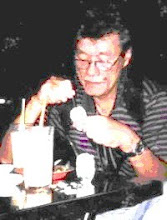
BELFOUR DUNDANG
In January 1978, Chinese New Year, my headmaster, the late Belfour Dundang with a friend of his from Batang Ai, Donnie ak Sutiong, paid me a visit to my house in Simaggang. According to Donnie ak Sutiong, his great grandfather, Gumba ak Jalak, had this story about how Simanggang was named:
A long long time ago, somewhere along the bank of Batang Lupar, there lived in a atap-leaf house, a Chinese with his family . They farmed in the interior land quite far from his house. At the same time,he engaged in some trading as well. By the river-side at the same location, there was another Chinese who traded in his boat. Due to some miss-understanding, these two Chinese were not in a good turn.
One day, an Iban came to the place to look for his Chinese friend on the bank of the river. He went up but he couldn't find his Chinese friend in the house. He turned back and asked the Chinese in the boat where about was his friend.
“Si magang! Si magang!” the Chinese in the boat shouted.
“Si" means “dead” in Chinese and "magang" means "all" in Iban."Si magang" means "All are dead!"--a mixture of Chinese and Iban.
So much so,the Iban went home but he was somehow diapponted because he did not know what the Chinese in the boat meant. However,from then on, when the local people along the river wanted to go to that particular place, they told their friend,” Aku deka ngagai Simanggang!”

From left: LBSeng, Belfour Dundang, Donnie ak Sutiong
Another story about Simanggang:
In 1958,my classmate,Sadie,asked our English teacher,Miss Sunta Tini,what Simanggang meant.
"China parai magang!" to all of us,Miss Sunta said.

From left: Sadie,Miss Sunta Tini


No comments:
Post a Comment